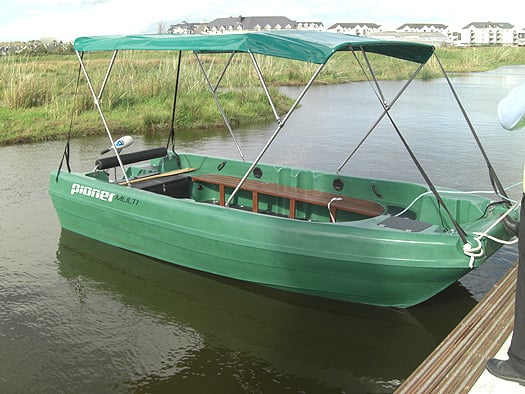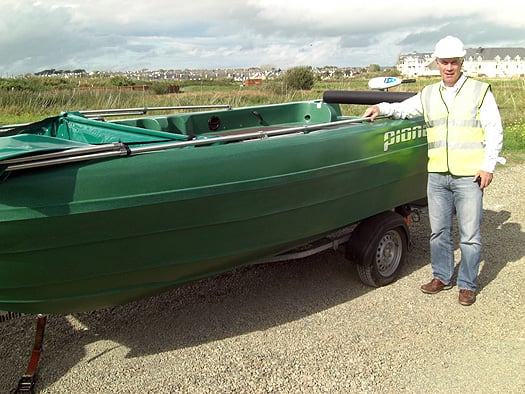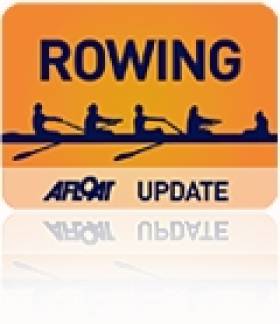Displaying items by tag: Lee Valley
Jegou Takes Place in Semi-Final at Lee Valley World Cup
#Canoeing: Liam Jegou qualified for the semi-finals of the canoe slalom World Cup in Lee Valley in London today. He took ninth place in the second run, and will go off second of the 30 C1 competitors in the semi-finals on Saturday. The top 10 go through to the final.
Jegou's Penalty-Free Run Not Fast Enough To Secure Olympic Place
#Canoeing: Ireland C1 paddler Liam Jegou finished outside the top 10 nations at the canoe sprint World Championships in Lee Valley in England today and missed out on this chance of qualifying the boat for the Olympic Games. Jegou went off second in his semi-final and had a penalty-free run down the course, but his time of 106.29 seconds was not fast enough to stand in the top 10 nations. Jegou came in 27th, ahead of Italy and Canada. Spain, Portugal and Australia also missed out.
Canoe Slalom World Championships, Lee Valley, London, Day Five (Irish interest)
Men
C1 – Semi-Finals (10 to Final): 27 L Jegou 106.29
K1 – Team Final: 19 Ireland 161.62
Ryan Best of Irish K1 Competitors at Canoe Slalom World Championships
#Canoeing: Cade Ryan was the most impressive of Ireland’s three competitors in the K1 at the canoe slalom World Championships in Lee Valley in England today. Ryan clocked 90.42 seconds and 89.69 in the two runs, with no penalties on either. Elliott Davidson and Sam Curtis were pushed well down the rankings, through penalties on both runs.
Canoe Slalom World Championships, Lee Valley, London, Day Three (Irish interest)
Men
K1 – First Run (top 30 to Semi-Finals): 60 C Ryan 90.42; 98 S Curtis 145.17 (incl 54 seconds penalty); 102 E Davidson 203.59 (incl 104 sec pen). Second Run (10 qualify): 27 Ryan 89.69; 41 Davidson 99.06 (incl 6 sec pen); 65 Curtis 146.05 (incl 56 sec pen).
Liam Jegou Excels in Second Run to Claim Semi-Final Place at World Championships
#Canoeing: Liam Jegou qualified for the semi-final of the canoe slalom World Championships in Lee Valley, England today. The France-based teenager produced an impressive, penalty-free, second run in the C1 to place ninth, with 10 places available. In his first run, he incurred penalties on gates eight and 11 and had four seconds in penalties, but would have fallen outside qualification in any case. Jake Cochrane placed 68th and 64th in his two runs.
Canoe Slalom World Championships, Lee Valley, London, Day Two (Irish interest)
Men
C1 – First Run (top 20 to semi-finals): 37 L Jegou 95.98 seconds (incl 4 sec pen); J Cochrane 161.15 (incl 54 sec pen). Second Run (10 qualify): 9 Jegou 90.83; 64 Cochrane 108.38 (incl 8 sec pen).
Women
C1 – First Run (top 15 to semi-finals) 32 C O’Ferrall 191.62; Second Run: O’Ferrall 132.14 (incl 4 sec pen)
Craig One Touch From Semi-Final at World Championships
#Canoeing: Ireland’s Hannah Craig came close, but missed out on qualifying for the semi-finals of the women’s K1 at the canoe slalom World Championships in Lee Valley in England today. She came down the course in 97.04 seconds on her first run, but a touch on gate 11 took her to 99.04 seconds, and pushed her out of the top 20, who qualified. The second run had just 10 qualifying places available. Craig finished 21st, with a penalty-free run of 100.4 seconds.
Canoe Slalom World Championships, Lee Valley, London, Day One (Irish interest)
Women
K1 – First Run (20 qualify): 30 H Craig 99.04 seconds (incl 2-sec penalty); 2nd Run (10 qualify): 21 H Craig 100.4 sec.
Keohane Wins Elite Single at Metropolitan Rowing Regatta
#ROWING: John Keohane won for the second day running at Metropolitan Regatta on Dorney Lake today. The Lee Valley man, who had won in the senior single sculls on Saturday, added the elite singles title in the Sunday programme to his list of successes. Cliona Hurst of NUIG also had a good day at the Olympic venue, taking the senior and intermediate one women's singles titles.
Metropolitan Regatta, Dorney Lake (Irish interest, selected results)
Saturday
Men
Eight – Senior: 2 Gráinne Mhaol/NUIG.
Four – Intermediate One: 1 Carlow. Four Coxed – Intermediate One: 1 NUIG
Pair – Intermediate One: 3 Presentation Brothers, Cork.
Sculling, Quadruple – Intermediate One: 2 UCC. Junior: 3 Cork BC
Single – Senior: 1 Lee Valley (J Keohane) Intermediate One: 3 Carlow (Aaron Bolger)
Women
Eights – Intermediate One: 1 UCD; 3 Trinity (three-boat final) Fours, coxed – Intermediate One: 1 UCD 7:19.2. Intermediate Two: 2 Commercial.
Pair – Senior: 2 Cork BC
Sculling, Quadruple – Intermediate One: 3 UCC.
Sunday
Men
Four – Intermediate One: 3 UCC.
Pair – Intermediate One: 1 Carlow; 3 NUIG.
Sculling, Quadruple – Intermediate One: 3 Cork BC.
Single – Elite: 1 Lee Valley (J Keohane) 7:22.
Women
Four – Senior/Intermediate One: 2 UCD (three-boat final). Four, coxed – Intermediate Two: 1 Commercial.
Pair – Intermediate One: 3 Cork (three-boat final).
Sculling, Quadruple – Intermediate One: 2 UCC.
Single – Senior: 1 NUIG (C Hurst) (two-boat final). Intermediate One: 1 NUIG (C Hurst). Intermediate Two: 2 Cork (A Bulman).
Safari Boats Order Boosts Kerry Boat Building Firm
Kerry Boat-builder O'Sullivan's Marine (OSM) is bucking the trend in the depressed marine industry. The Tralee firm have a busy order book and report strong demand for its traditional lake boat marque but it also has interest in more exotic boats too for the emerging nature tourism market.

Tried and tested, the new Safari boats are ready for Lee Valley
The first of the orders processed in Tralee is the supply of four Pioner Multi boats with Motor Guide 24v Electric Outboards for the local Lee Valley Development, a new eight hectare (20 acre) eco-tourism development comprising a Nature Park. The four boats will be used for safari-style boat rides.
'We carried out water trials yesterday, all is in order and the fully fitted out boats are being delivered this week', says managing director Brian O'Sullivan.

OSM's Brian O'Sullivan with one of the new Pioner boats
OSM, a member of the Irish Marine Federation, is also supplying two lake boats to Creeslough Angling Association in Donegal. Six Irish built boats have also been ordered by Dunfanaghy Angling Association in Donegal. Five more lake boats are also going to Waterville, Co. Kerry. All orders are for November delivery! Recession? What recession?
OSM have a selection of used craft on the boats for sale website. See them here

























































